 MIAMI, FL – Imagine a fishery worth hundreds of millions of dollars annually, for which virtually no data existed to inform management. Until recently, that was the case for the recreational fishery for bonefish, tarpon and permit. The current special issue of the scientific journal Environmental Biology of Fishes, focused on bonefish and tarpon, highlights exciting new research that will help manage these economically important fisheries sustainably.
MIAMI, FL – Imagine a fishery worth hundreds of millions of dollars annually, for which virtually no data existed to inform management. Until recently, that was the case for the recreational fishery for bonefish, tarpon and permit. The current special issue of the scientific journal Environmental Biology of Fishes, focused on bonefish and tarpon, highlights exciting new research that will help manage these economically important fisheries sustainably.
Bonefish, tarpon, and permit support economically important recreational and subsistence fisheries throughout their tropical and sub-tropical ranges. For example, the annual economic impact of the recreational fishery for bonefish, tarpon, and permit in the Florida Keys exceeds $465 million, and in Belize exceeds $50 million, and the fishery for bonefish in the Bahamas exceeds $141 million. These fisheries are critically important for local economies, so research that helps to improve management helps coastal communities remain sustainable.
The special issue on bonefish and tarpon results from the Fifth International Bonefish and Tarpon Symposium, and includes 15 scientific articles describing new research findings that will contribute to better management of these important fisheries. The special issue was co-edited by Aaron Adams, Director of Science and Conservation for Bonefish & Tarpon Trust and Research Associate Professor of Biological Sciences at Florida Institute of Technology, as well as Steven Cooke, Associate Professor and Canada Research Chair at Carleton University.
“If these fisheries are managed correctly, they can contribute to economic well-being in a sustainable way for communities that depend on the ocean for their living and way of life” said Adams. “The fact that the pace of research is increasing and that we’re seeing the research findings being applied to conservation is rewarding.”
Cooke, who with his students has conducted perhaps the most research on bonefish physiology in the scientific community, agreed. “We are able to take a fundamental research approach and apply it to real-world fisheries, which results in conservation applications. I am excited to see the new research that is the focus of this issue, and to see how far we have come over the last 10 years.”
Numerous articles in the special issue highlight the importance of collaborating with anglers to obtain the information necessary for conservation. This is essential for these types of fisheries that always have been and always will be data poor. Articles also address the importance of genetics in figuring out spatial scales of management (local vs. regional), as well as the interactions between fish and their habitats and the threats from coastal habitat loss and degradation.
The International Bonefish and Tarpon Symposium is hosted by Bonefish & Tarpon Trust every three years, and includes research scientists, fishery stakeholders, and resource managers. The articles in this Special Issue are from the 2014 Symposium. The next Symposium will be in 2017.
The full article list is below. To request a copy of an article please email info@bonefishtarpontrust.org with the article title(s) that you would like to receive.
Advancing the science and management of flats fisheries for bonefish, tarpon, and permit By Aaron J. Adams, Steven J. Cooke
Swimming energetics and thermal ecology of adult bonefish (Albula vulpes): a combined laboratory and field study in Eleuthera, The Bahamas By Liane B. Nowell, Jacob W. Brownscombe, Lee F. G. Gutowsky, Karen J. Murchie, Cory D. Suski, Andy J. Danylchuk, Aaron Shultz, Steven J. Cooke
Bonefishes in Hawai’i and the importance of angler-based data to inform fisheries management By Keith T. Kamikawa, Alan M. Friedlander…
Ecology and niche specialization of two bonefish species in Hawai‘i By Mary K. Donovan, Alan M. Friedlander, Kimberlee K. Harding, Alex Filous, Mary K. Donovan, Eva Schemmel
High intraspecific genetic connectivity in the Indo-Pacific bonefishes: implications for conservation and management By Elizabeth M. Wallace
Using local fishers’ knowledge to characterize historical trends in the Florida Bay bonefish population and fishery By Peter E. Frezza, Shawn E. Clem
Defining adult bonefish (Albula vulpes) movement corridors around Grand Bahama in the Bahamian Archipelago By Karen J. Murchie, Aaron D. Shultz, Jeffrey A. Stein, Steven J. Cooke, Justin Lewis, Jason Franklin, Greg Vincent, Edward J. Brooks, Julie E. Claussen, David P. Philipp
Mapping of stakeholder activities and habitats to inform conservation planning for a national marine sanctuary By Brooke D. Black, Aaron J. Adams, Chris Bergh
High resolution profiles of elements in Atlantic tarpon (Megalops atlanticus) scales obtained via cross-sectioning and laser ablation ICP-MS: a literature survey and novel approach for scale analyses By Matthew Seeley, Nathaniel Miller, Benjamin Walther
An overview of the tarpon genetic recapture study in Florida – a citizen science success story By Kathy Guindon, Carole Neidig, Mike Tringali, Samantha Gray, Thomas King, Chris Gardinal, Ben Kurth
Evaluating the efficacy of the Florida Keys’ angler-assisted permit tagging program By Robert Ahrens, Zak Slagle, Sarah Stevens, Aaron Adams
Transport and connectivity modeling of larval permit from an observed spawning aggregation in the Dry Tortugas, Florida By David R. Bryan, Jiangang Luo, Jerald S. Ault, David B. McClellan, Steven G. Smith, Derke Snodgrass, Michael F. Larkin
A nationwide assessment of threats to bonefish, tarpon, and permit stocks and habitat in Belize By Michael K. Steinberg
Physiological stress and reflex impairment of recreationally angled bonefish in Puerto Rico By Jacob W. Brownscombe, Lucas P. Griffin, Tyler Gagne, Christopher R. Haak, Steven J. Cooke, Andy J. Danylchuk
Impacts of sun protection on feeding behavior and mucus removal of bonefish, Albula vulpes By Kelly D. Hannan, Zachary C. Zuckerman, Christopher R. Haak, Aaron D. Shultz
BTT is a fisheries conservation organization dedicated to enhancing global bonefish, tarpon and permit fisheries and habitats through stewardship, research, education and advocacy. If you would like to learn more about Bonefish and Tarpon Trust’s efforts, please contact Dan Dow at 845.239.6051 or dan@bonefishtarpontrust.org or visit our website at www.btt.org.



